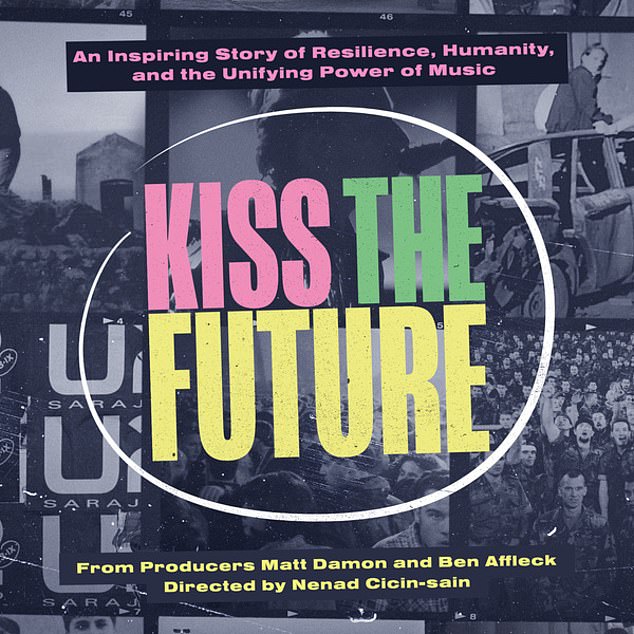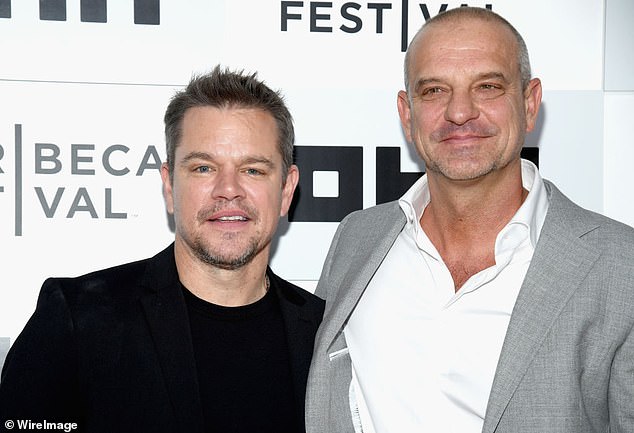A new documentary produced by Ben Affleck and Matt Damon has been declared ineligible to compete for the Best Documentary award at the upcoming Oscars.
The film, Kiss the Future, played in 139 AMC Theatres nationwide, including several Oscar-eligible markets such as Los Angeles, New York, San Francisco and Atlanta.
However, the documentary arm of the Academy of Motion Picture Arts and Sciences says the film was only shown twice a day during its run, not three times a day as Oscar rules dictate.
Affleck, Damon and fellow producer Sarah Anthony filed an appeal with the Academy, but it was rejected, according to Deadline.
Now the film’s director, Nenad Cicin-Sain, argues that the Academy should respect the rules, which technically shouldn’t exclude the film.
A new documentary produced by Ben Affleck and Matt Damon will not be eligible to compete for the Best Documentary award at the next Oscars

Kiss the Future was shown in 139 AMC Theatres nationwide, including several Oscar-eligible markets such as Los Angeles, New York, San Francisco and Atlanta.

Now the film’s director, Nenad Cicin-Sain, argues that the Academy should respect the rules, which technically shouldn’t exclude the film.
After the original story was published on Monday, many noted that there was nothing in the rules stating that the film had to play on a single screen in a qualifying market.
If you take into account all the qualifying markets Kiss the Future played in collectively, they should qualify.
Cicin-Sain wrote to the Academy on Monday saying there is no specific rule that would deem his film ineligible.
“There is no specific rule stating that the three daily screenings required for Academy Award qualification must all take place in the same theater within a qualifying city,” Cicin-Sain wrote to Natalie Wade, senior director of Member Relations and Academy Awards Administration.
‘The rule stresses that the film must be shown at least three times a day for a consecutive seven-day period in one of the eligible U.S. metropolitan areas. These cities include Los Angeles, New York, Chicago, Miami, Atlanta and the San Francisco Bay Area, the director added.
“Kiss the Future played in all of those markets for two weeks and far exceeded the minimum requirement of screenings per day (more than three times per day),” Cicin-Said added.
Cicin-Sain added: ‘The regulation you provided specifies that a film must be shown **three times per day** in a qualifying city, but it **does not explicitly state** that these screenings must all take place in the *same theater* within the qualifying city… Can you indicate where it says “3 times per day in the same theater”?’
The director adds that the rules they were given, which the filmmakers say were for the 96th Academy Awards, make no mention of a documentary being shown in a single location three times a day.
However, the Academy claims that a rule was added for the upcoming 97th Academy Awards, which states: ‘The seven consecutive days of the theatrical release must take place in the same location.
The Academy has not yet indicated why this new rule was added, which would limit, rather than broaden, qualification, since most qualifying documentaries get a symbolic single-theater release, i.e. a “four-wall” premiere.

After the original story was published on Monday, many noted that there was nothing in the rules stating the film had to play on a single screen in a qualifying market.

If all qualifying markets Kiss the Future played in collectively are taken into account, they should qualify.

“There is no specific rule stating that the three daily screenings required for Academy Award qualification must all take place at the same theater within a qualifying city,” Cicin-Sain wrote to Natalie Wade, senior director of member relations and awards administration for the Academy.

“What they are doing is applying the letter of the law and not the spirit of the law,” Cicin-Sain said Monday.
The Academy has given no indication as to why it would introduce such a narrow parameter for the 97th Oscars. And whether or not such a rule exists doesn’t speak to the filmmakers’ broader argument: If the Academy’s goal is to get people to see movies in theaters, Kiss the Future more than delivered. Most qualifying documentaries only receive a token release, but KTF got what amounts to a wide release for a nonfiction film.
“What they’re doing is applying the letter of the rule and not the spirit of the rule,” Cicin-Sain said Monday.
“And if the spirit of the rule is to put movies in theaters — and that’s what we did by showing them in as many theaters as possible — and then you don’t qualify, something’s wrong,” he added.
The film explores the 1990 siege of Sarajevo and shows how U2’s music helped cheer up the city’s residents.

